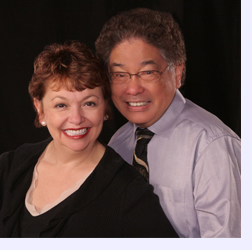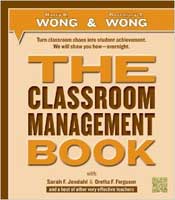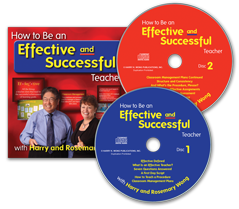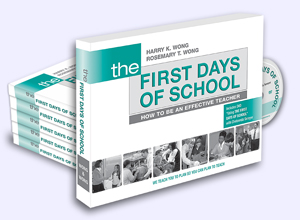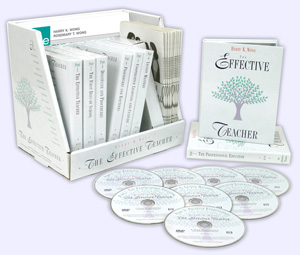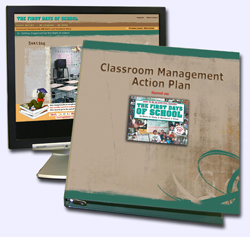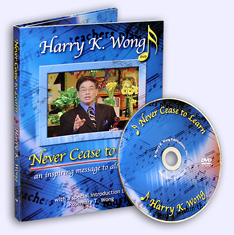|
 |
|
| |||||||||||||||
| by Harry & Rosemary Wong Special to the Gazette May 1, 2009 |
|||||||||||||||
Teachers Are the Greatest Assets
Improving Teacher Effectiveness The only factor that increased student achievement For over 20 years, we have worked tirelessly to help educators become more effective teachers. We have steered clear of fads, buzzword initiatives, and trendy programs. We are laser-focused on teacher effectiveness and how to achieve it. Our book, The First Days of School—How to Be an Effective Teacher, has sold 3.5 million copies and is in the professional libraries of teachers worldwide. It is used in 102 foreign countries and in over 2,010 colleges. The key word in the title is “Effective,” and is the reason for its success. Our DVD series, The Effective Teacher, was given the Telly Award as the best education video series of the past 25 years. Notice the word “Effective,” and yes, there’s a connection. For ten years, we have been writing the “Effective Teaching” column for www.teachers.net. “Effective” is the operative word for the content of the column. We publish an 8-page newspaper, Successful Teaching—For Those Who Want to Be EffectiveTeachers. It's free for the asking in any quantity at www.EffectiveTeaching.com. Just click the newspaper image on the homepage to order. Again, notice the word "Effective" in the newspaper's title. We are able to help teachers become more effective because we understand the research and make it applicable to the classroom. Foundations Tried to Help In 1991, Ron Ferguson, director of the Achievement Gap Initiative at Harvard University,reported, “A large scale study found that every additional dollar spent on raising teacher quality netted greater student achievement gains than did any other use of school resources.” Two years later, to demonstrate how we ignored the research, philanthropist Walter Annenberg created the Annenberg Challenge—a $500 million, five-year reform effort and the largest single gift ever made to American public education. Cities were urged to use the money to improve student achievement:
Sadly, but not surprisingly, five years later, the Annenberg Foundation reported that none of the programs improved student learning. Instead, what consistently delivered the best returns on student learning was money invested in giving teachers SUSTAINED opportunities to improve their classroom skills. It's not programs, fads, or ideologies. It's the teacher! The Bill and Melanie Gates Foundation invested $40 million toward supporting small schools nationwide. Unfortunately this did not result in improved student learning. Now, their focus is on charter schools and it’s predictable what the outcome will be—another failed attempt to improve teacher effectiveness. It’s the teacher that has the greatest impact on student achievement, but the Bill and Melinda Gates Foundation has invested no money to directly and systematically improve the effectiveness of teachers. The Annenberg and Gates foundations are not at fault. The great tragedy of money given to schools is that instead of heeding what research tells us, we choose to use the money to recycle the same old programs and ideologies that have failed time after time. Businesses spend $53 billion each year training their people—their assets—to make them worth more to a company. They know that the better their people—their assets—the more successful the company. However, ask a school administrator or policymaker to name their greatest asset, and they will often tell you it is money or programs. It’s uncommon to hear anyone say their teachers are their most valuable assets. Yet the research says it over and over again—teacher instructional effectiveness is the most critical factor by which to improve student achievement and to close the achievement gap. Make a Plan, Then Run with It Instead of spending money haphazardly, we need to learn to ask, “What exactly do we wish to accomplish? Richard Elmore, Harvard Professor of Educational Leadership, says, “To improve student learning, you do not change the structure (i.e. block scheduling, smaller class sizes, smaller school sizes, etc.). You change the instructional practices of the teachers. The schools that seem to do best are those that have a clear idea of what kind of instructional practice they wish to produce, and then design a structure to go with it.” Even when the odds are seemingly stacked against a school, Theodore Hershberger at the University of Pennsylvania found that good instruction is 15 to 20 times more powerful than family background and income, race, gender, or any other explanatory variables. “Qualified” Is Not the Same as “Effective” A term that often comes up in legislative acts and education circles is “highly qualified teacher.” “Highly qualified” and “qualified” are redundant terms. They are similar to “pregnant” and “highly pregnant.” “Highly qualified” is a term that was coined by the No Child Left Behind Act, which mandated that a teacher: 1) must have a college degree, 2) have a teaching credential, and 3) be competent in the subject he or she is to teach. We agree. However, a highly qualified teacher may not be an effective teacher! It is effective teachers that produce student learning and achievement, Therefore, you hire for qualifications, then train for effectiveness. It’s the Teacher. It’s the Teacher The research states over and over again, “It’s the teacher.”
Yes, it’s the teacher. It’s the teacher. You Win with Teachers
They did not ask for smaller class sizes, block scheduling, a literacy program, whole child instruction, or any other initiative, program, or structural change. They somehow knew—like Peter Drucker, John Goodlad, Ron Ferguson, Richard Elmore, Theodore Hershberger, Robert Marzano, and Eric Hanushek, education researchers whose work are in this month’s column—that the greatest assets of their school are the teachers. A Solid Investment Successful schools wisely invest in their teachers and in the effectiveness of their teachers. They do not adopt programs in pursuit of a quick fix. We know that good teaching matters for student achievement more than any other single education resource. We also know that the first group to benefit from an increase in teacher effectiveness are the lower-achieving students. It’s not rocket science—the better the teacher teaches, the better the students learn. The Price of Effectiveness You, the teacher, are responsible for the learning that takes place in your classroom. It’s not the school environment, the principal, the textbooks, or the desks—it’s You! What will you do to increase your effectiveness?
Teachers are the greatest asset of a school and of humanity. You have an awesome responsibility. Use your summer to invest in yourself. Return to the classroom with the skills and determination needed to make each moment count for each child. Don’t waste their time in the classroom with you. You are their best hope for a brighter tomorrow. We wish you an enlightening summer and many light bulb moments for your students!
|
|||||||||||||||
|



